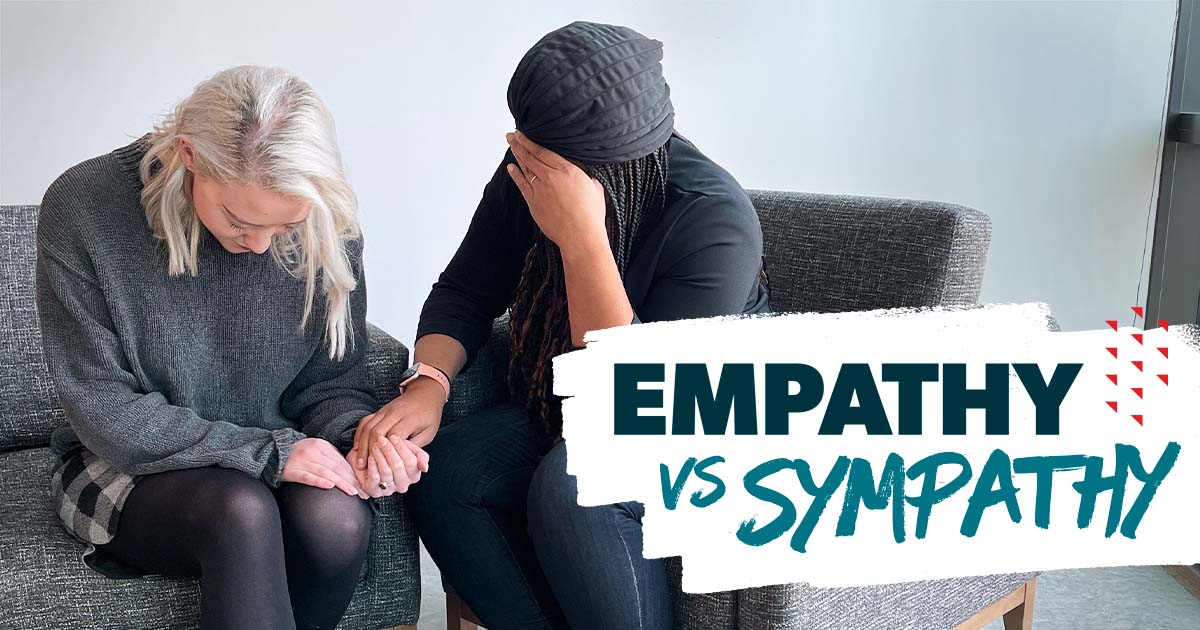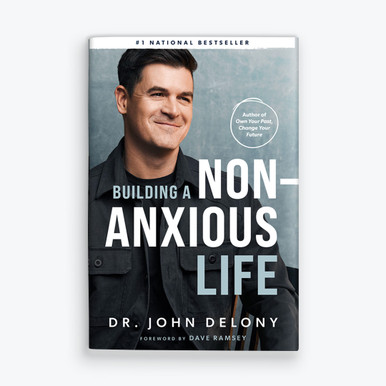Empathy vs. Sympathy: What's the Difference?
9 Min Read | May 9, 2024

If you hang out with mental health nerds for more than five minutes, you’ll probably hear them talking about empathy. It’s been a huge area of research in the past couple of decades, and scholars like Brené Brown have made it easy for us to understand how important empathy is to our relationships and emotional health.
But there’s also some confusion. What is empathy, exactly? And how do we define empathy versus sympathy? The difference is subtle but important. Let’s check it out.
What’s the Difference Between Empathy and Sympathy?
Empathy and sympathy are both ways we respond to the suffering of people around us. But there’s a crucial difference: Sympathy is acknowledging someone else’s pain, but empathy is choosing to feel the pain with them. Sympathy says, “I care about you,” and empathy says, “I’m hurting with you.”
I know this is an abstract idea, so let’s break it down some more.
What Is Sympathy?
Sympathy is being aware of and sensitive to the needs and suffering of others. It’s recognizing—or even honoring—the reality of a tough situation. But although you’re expressing sadness, you still have an emotional boundary around yourself to keep from feeling what the sufferer is feeling.
You can feel sympathy for someone’s situation and remain unmoved. It’s like driving by someone on the side of the highway with a flat tire and saying, “Poor thing,” or as people like to say here in Nashville, TN, “Bless your heart.” But ultimately, sympathy does not motivate us to connect with others. We can sympathize while zooming by that stranded driver, leaving them to deal with the flat tire alone.
What Is Empathy?
Empathy is understanding and vicariously experiencing what others are going through. It’s sitting in their pain. It takes creativity to empathize because you’ve got to imagine yourself in the situation of the other person and feel how heavy the burden truly is.
Empathy is choosing to “Rejoice with those who rejoice, weep with those who weep” (Romans 12:15 ESV). But beneath rejoicing and weeping, it’s digging in to truly listen to and know someone so you can ultimately internalize their experience.
When my little girl comes into my room in the middle night because she had a bad dream, I can choose to respond with empathy by inviting her in, holding her close, and listening to her fear. I can remember what it felt like to have nightmares when I was a kid. I can provide a safe, warm space to breathe and de-escalate (the nerd word for “calm down”). I don’t try to fix or rationalize her problem. I sit with her in it.
Empathy is nonjudgmental. It’s an attitude of curiosity and acceptance and sharing tissues. It’s being emotionally intelligent and treating someone the way you’d want to be treated—right here, right now, in any given moment.
Sympathy vs. Empathy: Which One Is Better?
Both sympathy and empathy are important relational and emotional skills and are helpful in different contexts. However, empathy is a must-have for relationships because empathy fuels connection. It’s not enough for the people we care about to acknowledge our experiences. It’s not enough that people know about us. People aren’t living Wikipedia pages. We long to share our experiences.
At this point, you might be thinking that sympathy is bad and empathy is good. Or at the very least, one is better than the other. Instead of thinking good or bad, think about the context.
Want to build a non-anxious life? Learn how in Dr. John Delony’s new book.
Empathy is necessary, but it’s exhausting. It’s commitment. It’s deep, deep connection. And as citizens of a wired world, we are living under an onslaught of horrific news, sad stories and chaotic events that are out of our control. We can’t practice empathy for every single person on the planet—we would eventually burn out.
Sympathy can be helpful. It allows us to learn about the oppression, pain and tragedy running rampant in our world and then make decisions about how we can intentionally influence our community. Sympathy makes sure our eyes are open and aware, and it informs our actions.
But when it comes to the people we are given to love and care for—our family, friends, neighbors, coworkers, church community—empathy is essential. In fact, the depth of your relationships will be determined by the depth of your empathy.
Okay, okay . . . This sounds nice, but it feels so out there. So abstract. How do I actually do this whole empathy thing?
I’m glad you asked.
How to Practice Empathy
Empathy, just like other relationship skills, is a choice. It’s choosing to sit next to hurting people and keep your mouth shut. You can only learn empathy by listening to other people’s stories and witnessing their pain.
Empathy is also something you can learn and practice. Like lay-ups back when you were playing middle school basketball. Like typing. Or like riffs on your guitar. Sure, some people might naturally be more empathetic, but anyone can learn how to empathize, even if it means you need to work with a therapist.
New! Building a Non-Anxious Life
For now, here are a few tools to add to your belt.
Show up.
Practicing empathy starts with just showing up. Throughout my career, I’ve had the privilege of showing up to sit with people in the darkest moments of their lives. I sat with parents who had just discovered their dead child in the next room. I sat with wives whose husbands would never walk through the door again. I met with parents of young people who had taken their lives.
Do you know what I learned?
There’s nothing to say in those moments. Literally—nothing. But presence is everything. When people are gasping for air, they need to feel that they’re not alone. So show up. Hug tight. Sit on the couch. Go to the funeral. Buy the plane ticket. When people are grieving, they don’t need your advice or your explanations. They need your presence . . . and maybe tacos.
Be a good listener.
Empathetic people are good listeners. They look people in the eye and nod. They ask follow-up questions. And they’re not listening for their turn to tell a 2.0 version of the story that this person is telling. Practice entering into conversations just to listen. Just to affirm. Just to laugh at someone else’s jokes.
When you’re in a conversation with someone you care about, be intentional with your focus. Put your screens down. Demonstrate physically and verbally that the person you’re with is the most important thing in your world at this moment.
Practice mirroring.
Mirroring is the act of reflecting someone to themselves. It’s a tremendous way to help people feel seen and validated. If your partner comes home and shares a story about their terrible boss, you could say something like, “That sucks. It sounds like you’re feeling tired and frustrated. I can understand why you’d be discouraged.”
Connect with people by using phrases like “Tell me how that feels” or “Tell me more about that.” Both statements are invitations for the person you’re with to connect on a deeper level.
Remember: Empathy is about connection. It’s choosing to experience what someone else is experiencing. It’s not about solutions—because empathy is often the solution in and of itself.
Remember that it’s not your job to fix everything.
Another way to practice empathy is to resist the urge to jump to problem-solving mode when people open up with you.
Most of us think way too highly of ourselves and are way too quick to offer our opinions. People rarely need our rants about what they should have done or what you would have done. Most people—most of the time—just need to be heard. When we tell people how they should fix their problems, they’ll only feel more incompetent or out of control. They’ll shut down.
So, don’t fix. Don’t lecture.
And of course, if you do have a helpful idea or resource, you can ask permission to share it. You may even ask, “Do you want a hug or my opinion?” But don’t assume the other person needs it or even wants it. There’s a good chance they came to you for support—not for advice.
Don’t compare suffering or grief.
The experience of tragedy is confusing and disorienting. And one of the things we often do when we’re hurting is try to make sense of our pain by comparing our situation with someone who is better or worse off than we are. This is called comparative grief, and it’s pointless and damaging.
We were all doing this during the COVID-19 pandemic. We were comparing all of our grief to everything else in the world. Yes, your prom was canceled, but at least you didn’t get sick. Yes, you got sick, but at least you weren’t on a ventilator. Yes, you were in the ICU for weeks, but at least you made it out alive. Yeah, you lost your dad, but at least . . .
It goes on and on.
When someone is suffering, don’t point out the silver lining. Don’t remind them that things could be worse. They’ll make sense of it over time, but that comes later in the grieving process. This is a BIG one: Do not tell them about a time when you (or your cousin’s friend’s roommate) had a way bigger tragedy. Simply acknowledge the pain of what this person in front of you is going through, no matter how big or small.
Read fiction.
Yes, you read that right! Getting lost in a good novel could make you better at relationships. Stories allow us to practice empathy because they transport you emotionally into someone else’s experience. Fiction gives us a window into what the characters are thinking and feeling and how they’re processing the world. A good book is a reality simulator for real life.
Improve Your Relationships by Tuning In to The Dr. John Delony Show
Empathy is a lifelong skill, and we are all in process. If you want to keep learning how to practice empathy, I’d love to have you join us over at The Dr. John Delony Show. I take calls from people in a lot of tough and crazy situations—people like you and me who are learning how to be more empathetic.


